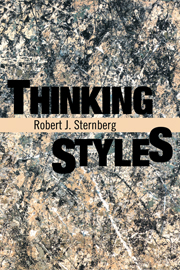Book contents
- Frontmatter
- Contents
- Preface
- Part I The Nature of Thinking Styles
- Part II The Principles and Development of Thinking Styles
- Part III Thinking Styles in School and in Research and Theory
- 7 Thinking Styles in the Classroom: What Have We Learned?
- 8 A Capsule History of Theory and Research on Styles
- 9 Why a Theory of Mental Self-government?
- Notes
- Index
9 - Why a Theory of Mental Self-government?
Published online by Cambridge University Press: 05 August 2012
- Frontmatter
- Contents
- Preface
- Part I The Nature of Thinking Styles
- Part II The Principles and Development of Thinking Styles
- Part III Thinking Styles in School and in Research and Theory
- 7 Thinking Styles in the Classroom: What Have We Learned?
- 8 A Capsule History of Theory and Research on Styles
- 9 Why a Theory of Mental Self-government?
- Notes
- Index
Summary
The theory of styles that has been described in this book is a theory of mental self-government. There is one basic assumption to the theory, namely, that the kinds of governments we have in the world are not merely arbitrary and perhaps random constructions, but rather in a certain sense are mirrors of the mind. In other words, they reflect different ways in which people can organize or govern themselves. On this view, then, governments are very much extensions of individuals: They represent alternative ways in which collectivities, like individuals, can organize themselves.
Before going into details, simply consider the concept at an intuitive level. Take Jake. Jake is failing in high school. Intelligence testing reveals him to be of above-average intelligence, so whatever his problem is, it isn't lack of ability. People who observe Jake are struck by his obvious intelligence, on the one hand, but also by what seems to be some kind of internal chaos, on the other. Jake's attention rarely seems to focus on any one thing for more than a few minutes at a time. Even in conversations, he rambles, moving from one topic to the next, and then to another. His writing, like his conversations, is disorganized, the thoughts seemingly jumbled. When he remembers to do homework, he organizes his time poorly, so that much of what he needs to get done does not actually get done. Jake is rebellious in school, and seems to view it as a prison.
- Type
- Chapter
- Information
- Thinking Styles , pp. 148 - 160Publisher: Cambridge University PressPrint publication year: 1997



